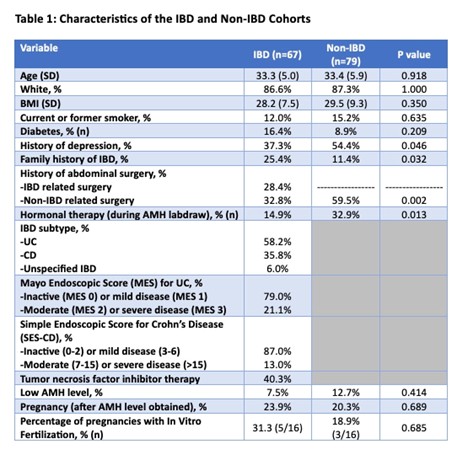Monday Poster Session
Category: IBD
P3221 - Association Between Inflammatory Bowel Disease in Women and the Fertility Marker Anti-Müllerian Hormone
Monday, October 27, 2025
10:30 AM - 4:00 PM PDT
Location: Exhibit Hall

Inas FS Fouad Soliman Mikhail, MD (she/her/hers)
Mayo Clinic
Jacksonville, FL
Presenting Author(s)
Inas FS. Mikhail, MD1, Tarek Odah, MD1, Jana G. Hashash, MD, MSc, FACG1, Jennifer Farraye, APRN2, Wendy Kuohung, MD2, Francis A.. Farraye, MD, MSc, MACG1
1Mayo Clinic, Jacksonville, FL; 2Boston Medical Center, Boston University School of Medicine, Boston, MA
Introduction: Inflammatory Bowel Disease (IBD) is an immune mediated disorder characterized by inflammation in the digestive tract with extraintestinal manifestations commonly encountered. The impact of IBD and its treatments on female fertility remains unclear. Anti-Müllerian hormone (AMH) levels are commonly used to assess ovarian reserve, a marker of infertility. Our study evaluates the association between IBD, AMH levels, and infertility.
Methods: This retrospective study utilized electronic medical records from a tertiary multicenter health system from January 2017 to September 2024. Females with IBD and matched controls who had AMH measured were included while patients with immunocompromising conditions unrelated to IBD were excluded. Baseline characteristics such as IBD, surgical and medical histories, were compared. Fisher’s exact test was used for analysis.
Results: A total of 146 patients were included in the study, with 67 patients diagnosed with IBD and 79 control patients. Among patients with IBD, 7.5% (5/67) exhibited low AMH levels, whereas 12.7% (10/79) of non-IBD patients had low AMH levels (p=0.41). In multivariable logistic regression adjusting for age, ethnicity, body mass index, nicotine use, and hormonal therapy, IBD was not significantly associated with low AMH levels (OR 0.67, 95% CI 0.21–2.18, p=0.505). In age-stratified analyses using Fisher’s exact test, IBD status was not significantly associated with low AMH levels in women under 35 (p=0.055) or those aged 35 and older (p=0.733). Additionally, there was no significant association between low AMH levels and IBD subtype (UC vs. CD); p=1.00. Low AMH levels were found in 0% (0/30) of women with UC in remission or with mild disease activity and 12.5% (1/8) with moderate or severe disease activity. Low AMH levels were found in 5% (1/20) of women with CD remission or with mild disease activity and 0% (0/3) with moderate or severe disease activity.
Discussion: Our study compared low anti-Müllerian hormone levels between patients with and without IBD, revealing no significant differences across age groups or between types of IBD. These data suggests that IBD may not be directly associated with decreased ovarian reserve. However, the majority of our IBD cohort had inactive or mild disease, which may limit the validity of these findings. Future studies with larger sample sizes and a deeper focus on the impact of treatment regimens and disease activity on fertility outcomes in IBD patients are needed.

Figure: Table 1: Characteristics of the IBD and Non-IBD Cohorts

Figure: Table 2: Medications used for IBD treatment
Disclosures:
Inas Mikhail indicated no relevant financial relationships.
Tarek Odah indicated no relevant financial relationships.
Jana Hashash: BMS – Ad Board.
Jennifer Farraye indicated no relevant financial relationships.
Wendy Kuohung indicated no relevant financial relationships.
Francis Farraye: Astellas – Advisory Committee/Board Member. Avalo – Advisory Committee/Board Member. Bausch – Advisory Committee/Board Member. BMS – Advisory Committee/Board Member. Braintree Labs – Advisory Committee/Board Member. Fresenius Kabi – Advisory Committee/Board Member. GI Reviewers – Independent Contractor. IBD Educational Group – Independent Contractor. Iterative Health – Advisory Committee/Board Member, Stock Options. Janssen – Advisory Committee/Board Member. Lilly – DSMB. Pfizer – Advisory Committee/Board Member. Pharmacosmos – Advisory Committee/Board Member. Sandoz – Advisory Committee/Board Member. Viatris – Advisory Committee/Board Member.
Inas FS. Mikhail, MD1, Tarek Odah, MD1, Jana G. Hashash, MD, MSc, FACG1, Jennifer Farraye, APRN2, Wendy Kuohung, MD2, Francis A.. Farraye, MD, MSc, MACG1. P3221 - Association Between Inflammatory Bowel Disease in Women and the Fertility Marker Anti-Müllerian Hormone, ACG 2025 Annual Scientific Meeting Abstracts. Phoenix, AZ: American College of Gastroenterology.
1Mayo Clinic, Jacksonville, FL; 2Boston Medical Center, Boston University School of Medicine, Boston, MA
Introduction: Inflammatory Bowel Disease (IBD) is an immune mediated disorder characterized by inflammation in the digestive tract with extraintestinal manifestations commonly encountered. The impact of IBD and its treatments on female fertility remains unclear. Anti-Müllerian hormone (AMH) levels are commonly used to assess ovarian reserve, a marker of infertility. Our study evaluates the association between IBD, AMH levels, and infertility.
Methods: This retrospective study utilized electronic medical records from a tertiary multicenter health system from January 2017 to September 2024. Females with IBD and matched controls who had AMH measured were included while patients with immunocompromising conditions unrelated to IBD were excluded. Baseline characteristics such as IBD, surgical and medical histories, were compared. Fisher’s exact test was used for analysis.
Results: A total of 146 patients were included in the study, with 67 patients diagnosed with IBD and 79 control patients. Among patients with IBD, 7.5% (5/67) exhibited low AMH levels, whereas 12.7% (10/79) of non-IBD patients had low AMH levels (p=0.41). In multivariable logistic regression adjusting for age, ethnicity, body mass index, nicotine use, and hormonal therapy, IBD was not significantly associated with low AMH levels (OR 0.67, 95% CI 0.21–2.18, p=0.505). In age-stratified analyses using Fisher’s exact test, IBD status was not significantly associated with low AMH levels in women under 35 (p=0.055) or those aged 35 and older (p=0.733). Additionally, there was no significant association between low AMH levels and IBD subtype (UC vs. CD); p=1.00. Low AMH levels were found in 0% (0/30) of women with UC in remission or with mild disease activity and 12.5% (1/8) with moderate or severe disease activity. Low AMH levels were found in 5% (1/20) of women with CD remission or with mild disease activity and 0% (0/3) with moderate or severe disease activity.
Discussion: Our study compared low anti-Müllerian hormone levels between patients with and without IBD, revealing no significant differences across age groups or between types of IBD. These data suggests that IBD may not be directly associated with decreased ovarian reserve. However, the majority of our IBD cohort had inactive or mild disease, which may limit the validity of these findings. Future studies with larger sample sizes and a deeper focus on the impact of treatment regimens and disease activity on fertility outcomes in IBD patients are needed.

Figure: Table 1: Characteristics of the IBD and Non-IBD Cohorts

Figure: Table 2: Medications used for IBD treatment
Disclosures:
Inas Mikhail indicated no relevant financial relationships.
Tarek Odah indicated no relevant financial relationships.
Jana Hashash: BMS – Ad Board.
Jennifer Farraye indicated no relevant financial relationships.
Wendy Kuohung indicated no relevant financial relationships.
Francis Farraye: Astellas – Advisory Committee/Board Member. Avalo – Advisory Committee/Board Member. Bausch – Advisory Committee/Board Member. BMS – Advisory Committee/Board Member. Braintree Labs – Advisory Committee/Board Member. Fresenius Kabi – Advisory Committee/Board Member. GI Reviewers – Independent Contractor. IBD Educational Group – Independent Contractor. Iterative Health – Advisory Committee/Board Member, Stock Options. Janssen – Advisory Committee/Board Member. Lilly – DSMB. Pfizer – Advisory Committee/Board Member. Pharmacosmos – Advisory Committee/Board Member. Sandoz – Advisory Committee/Board Member. Viatris – Advisory Committee/Board Member.
Inas FS. Mikhail, MD1, Tarek Odah, MD1, Jana G. Hashash, MD, MSc, FACG1, Jennifer Farraye, APRN2, Wendy Kuohung, MD2, Francis A.. Farraye, MD, MSc, MACG1. P3221 - Association Between Inflammatory Bowel Disease in Women and the Fertility Marker Anti-Müllerian Hormone, ACG 2025 Annual Scientific Meeting Abstracts. Phoenix, AZ: American College of Gastroenterology.
